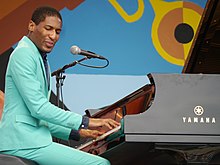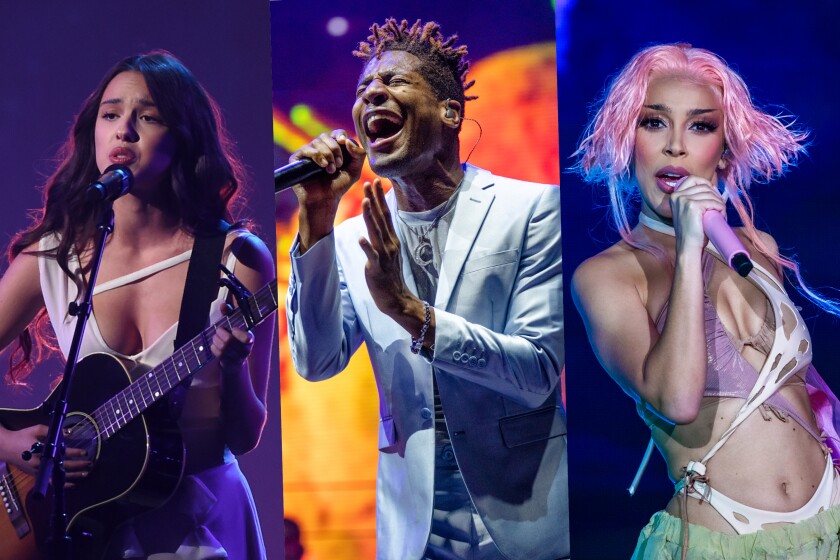SOUND PROJECTIONS
AN ONLINE QUARTERLY MUSIC MAGAZINE
EDITOR: KOFI NATAMBU
WINTER, 2021
VOLUME ELEVEN NUMBER ONE
RAPHAEL SAADIQ
Featuring the Musics and Aesthetic Visions of:
JON BATISTE
(December 25-31)
MULGREW MILLER
(January 1- 7)
VALERIE COLEMAN
(January 8-14)
CHARNETT MOFFETT
(January 15-21)
AMYTHYST KIAH
(January 22-28)
CHRISTONE INGRAM
(January 29--February 4)
MARCUS ROBERTS
(February 5-11)
IMMANUEL WILKINS
(February 12-18)
WYCLIFFE GORDON
(February 19-25)
FREDDIE KING
(February 26-March 4)
DOREEN KETCHENS
(March 5-11)
TERRY POLLARD
(March 12-18)
https://www.allmusic.com/artist/jon-batiste-mn0002730073/biography
Jon Batiste
(b. November 11, 1986)
Artist Biography by Matt Collar
Keyboardist, singer, and composer Jon Batiste is an ebullient and highly eclectic performer with a sound that combines the jazz traditions of his New Orleans home with a vibrant blend of funk, pop, and R&B. Since 2015, Batiste has been the bandleader and musical director for CBS' The Late Show with Stephen Colbert. He has toured the globe with his own Stay Human ensemble and issued releases like 2013's chart-topping jazz album Social Music. A member of the esteemed Batiste musical family, he emerged in his teens as a gifted jazz pianist with a strong grasp of the Crescent City jazz and R&B sound. Batiste has busked on street corners, held music clinics worldwide, and managed to draw multitudes to his wide-open, accessible brand of rhythmic swing on virtually any keyboard instrument he chooses, in any genre. Though heralded as a brilliant pianist and organist, his use of the melodica -- which has graced albums by artists ranging from Stevie Wonder and Harry Connick, Jr. to Trombone Shorty -- has become a visible signature of his work. Batiste has earned accolades including Grammy nominations for his rootsy take on "Saint James Infirmary" off 2018's expansive Hollywood Africans and for 2020's Chronology of a Dream: Live at the Village Vanguard. He has also scored films, such as Spike Lee's Red Hook Summer and 2020's animated Pixar movie Soul, the latter of which won an Oscar for Best Original Score. Batiste followed that with his stylistically cross-pollinated eighth solo album, We Are, in 2021.
Born in 1986 in Kenner, Louisiana, Batiste grew up in a musical family as the nephew of New Orleans musical greats Lionel Batiste and Harold Battiste, and first performed with his relatives in the Batiste Brothers Band. Educated at the New Orleans Center for Creative Arts, he graduated (along with classmate Trombone Shorty) in 2004. A year later, he released his debut album, 2005's Times in New Orleans, featuring drummer Jason Marsalis, saxophonist Donald Harrison, Jr., and trumpeter Christian Scott.
After high school, Batiste studied at the Juilliard School in New York City. It was during this time that he began performing around the city with his trio featuring bassist Phil Kuehn and drummer Joe Saylor. He featured this group on his 2005 album Live in New York: At the Rubin Museum of Art.
Eventually, Batiste added saxophonist Eddie Barbash to his trio, and the ensemble Stay Human was born. Batiste & Stay Human began performing impromptu outdoor concerts and quickly earned acclaim for their lively mix of jazz, gospel, pop, and R&B. The group released their debut EP in 2011, followed by the 2013 full-length album Social Music, which reached the top of the Billboard jazz chart. Also in 2013, Batiste joined Red Hot Chili Peppers drummer Chad Smith and bassist/producer Bill Laswell to record the soundtrack to a forthcoming film. While the movie never materialized, the soundtrack the trio recorded was released in 2014 as The Process.
In 2015, Batiste & Stay Human became the house band for the CBS nighttime talk show The Late Show with Stephen Colbert. The following year, they issued the Late Show EP, featuring The Late Show's intro and outro themes, as well as live cuts recorded during commercial breaks. The album debuted at number three on the Jazz Albums chart. Later in 2016, the pianist released the holiday album Christmas with Jon Batiste.
Two years later, in the fall of 2018, Batiste issued his debut album for Verve, Hollywood Africans. Produced by T-Bone Burnett, the record found Batiste diving deep into his personal and cultural heritage, weaving an intimate tapestry from original material and American standards, creating a musical journey from early New Orleans jazz to the jazz and pop of the present day. The set peaked at number two on the Billboard Jazz Albums chart and earned Batiste a Grammy nomination for Best American Roots Performance for his rendition of "Saint James Infirmary."
In August 2019, he returned with Anatomy of Angels: Live at the Village Vanguard, which captured Batiste in concert during his 2018 residency at the storied New York City venue. Featured alongside the pianist were guests including Lake Street Dive vocalist Rachael Price, tenor saxophonist Tivon Pennicott, trumpeter Jon Lampley, and others. A companion album culled from Batiste's Vanguard residency, Chronology of a Dream: Live at the Village Vanguard, followed that October.
Meditations, a collaboration with guitarist Cory Wong, arrived in May 2020 and picked up a Grammy nomination for Best New Age Album. The next month, Batiste
released the song "We Are," inspired by the Black Lives Matter protest
movement. Later that year, he contributed songs to the animated
Disney-Pixar film Soul (which also featured music by Trent Reznor and Atticus Ross) and released a companion album, Music from and Inspired by Soul. Along with a Golden Globe, Soul won the Oscar for Best Original Score. In March 2021, Batiste released the pop-oriented studio album We Are, which featured guest appearances by Mavis Staples, author Zadie Smith, PJ Morton, Trombone Shorty, and others. The album and single "I Need You" were nominated for Grammy Awards later that year.
https://www.allaboutjazz.com/musicians/jon-batiste
Pianist Jonathan Batiste is a member of a long lineage of musicians from the Batiste family of Louisiana. He was introduced to music by his family's band, the Batiste Brothers Band, in which he played percussion/drums at age 8. He switched to piano around the age of 12.
By the age of 17, he released the first of his two CDs as a leader entitled “Times In New Orleans” featuring New Orleans musicians Jason Marsalis, Donald Harrison, Jr., and Christian Scott. By then he was already attracting considerable attention as a young musician of great talent and potential. In 2004 he graduated from the New Orleans Center for Creative Arts (NOCCA) as a prime young performer. He then went on to study at the prestigious Juilliard School in New York.
In 2005 Batiste made his debut at Carnegie Hall and began performing regularly around the New York music scene with his trio, including bassist Phil Kuehn and drummer Joe Saylor. Soon he added tenor saxophone virtuoso, Matt Marantz, and 15 year old child prodigy, Eddie Barbash on alto saxophone. Batiste has toured extensively with this quintet in recent years.
In 2006 he received the “Movado Future Legend Award,” being the only one to receive the honor for jazz. Prior to the honor, Jonathan had already released his second CD “Live In New York: At The Rubin Museum Of Art”. Closing out 2006, Batiste had already been a featured performer in South Africa, London, Lisbon, Spain, Paris, and the U.S.
In 2007 he made his debut at the world renowned Concertgebouw (Amsterdam), producing and performing his own show. In addition to the show, he also conducted music clinics/master classes and workshops throughout all of Holland in inner city schools and underprivileged neighborhoods. As a result, he was invited back to Carnegie Hall to produce and perform in his own show. The performance included six young musicians from the Netherlands in which Batiste composed music featured in the program. The performance concluded with an epic finale he composed for choir, jazz combo, and orchestral instruments. It was viewed as a hugely successful cultural exchange and garnered national attention. Also in 2007, Batiste began an ongoing collaboration with vocalist Cassandra Wilson.
Starting off 2008, Batiste was a featured member of the 2008 NBA All-Star Game halftime show. Batiste was the youngest artist alongside Allen Toussaint, Harry Connick, Jr., Dr. John, Ellis Marsalis, Art Neville, Ivan Neville, and Davell Crawford.
By 2009, Batiste had released 2 CD's and 2 EP's of his own, and performed in over 40 countries. He has chosen the melodica as a current focus. Adopting it as one of his signatures, he has already helped to further popularize the instrument. He has named the instrument the Harmonabord.
Batiste is also known most by the name Jon Batiste, which is the name he assumes when performing worldwide with The Jon Batiste Band.
As of today, Batiste's popularity is growing rapidly and his work is becoming more widely known to an impressive variety of music genres. Batiste works on many artistic endeavors in addition to live performance which include collaborative projects with actors/actresses, dancers, artists and contemporary music artists of his generation. These projects are all independently produced. He is also an active educator.
He has recorded and/or performed with various artist including Ellis Marsalis, Wynton Marsalis, Lenny Kravitz, Harry Connick Jr., Cassandra Wilson, Derek Trucks, Jimmy Buffett, Abbey Lincoln, Roy Hargrove and more.
2009 and 2010 has found Jonathan touring extensivlyy with The Roy Hargrove Quintet and The Roy Hargrove Big Band throughout the US, Europe, and Japan.
Source: Kandie Le Britain Webster, Contributing Editor
https://www.nytimes.com/2018/12/13/us/jon-batistes-cities-conference.html
Jon Batiste’s World Is Wonderful, but Flawed
NEW ORLEANS — Discussing his views on music’s role in a city’s culture, the jazz keyboardist Jon Batiste, who is the band leader on “The Late Show With Stephen Colbert,” told a panel in New Orleans that music has a unique power to inspire action.
Music has always been the soundtrack of movements, he said.
Mr. Batiste, 32, who hails from the nearby suburb of Kenner, spoke with Marc Lacey, the national editor of The New York Times, then concluded by stepping to the piano and playing a stark, somewhat melancholy rendition of “What a Wonderful World,” a tune made famous by Louis Armstrong.
The performance was perfect, as the lyrics seemed to reflect Mr. Batiste’s inherent optimism, while his contemplative execution communicated the musician’s awareness of social inequity that permeated the Armstrong era and beyond. Mr. Batiste, the final panelist at the Cities for Tomorrow conference, talked about how his career and musical aesthetic were molded by two dynamic cities.
In New Orleans, he was steeped in jazz culture, both as a member of one of the city’s premier musical families and as a student at the New Orleans Center for Creative Arts. When, at age 17, his talent took him to the Juilliard School in New York, he absorbed the kinetic nature of the metropolis, where he and his band played mini concerts for subway riders.
Earlier panelists had discussed how the rise in population and economic vitality in many cities had exacerbated inequity. Mr. Batiste’s view of music’s role in city culture reflected his resistance to urban unfairness. When Mr. Lacey asked if music could be part of “the actual lifting up of cities,” Mr. Batiste responded in activist terms.

Music can inspire action, he said. “Music has always been a way for people to endure hardship and figure out how to really connect to their humanity or affirm their humanity when everything around them is trying to squash their humanity,” he said.
The importance of music, he added, goes beyond entertainment. “In any situation, music can be used as a reprieve or a balm.”
Not all of Mr. Batiste’s comments on music and its impact on city lifestyle were as weighty.
He confessed that he liked to play his piano loudly, which irks his neighbors in tight New York apartment buildings. Or, at least it used to. As he explained, when he became a television personality, the reproachful notes and the pounding on his floor from the room below magically ceased.
Reflecting on his instant upsurge in prestige upon taking the “Late Show” job, he said, “TV is crazy.”
In addition to his TV duties, Mr. Batiste is working on the score for a Broadway musical based on the life of the late 1980s art superstar Jean-Michel Basquiat.
The title of Mr. Batiste’s most recent album, “Hollywood Africans,” was taken from a 1983 Basquiat painting. The album includes his gorgeously ironic “What a Wonderful World.”
ABOUT THE AUTHOR:
Doug MacCash is a reporter for NOLA.com | The Times-Picayune
Jonathan Michael Batiste (born November 11, 1986)[2] is an American musician, bandleader, and television personality.[3] He has recorded and performed with artists in various genres of music (Stevie Wonder, Prince, Willie Nelson, Lenny Kravitz, Ed Sheeran, Roy Hargrove, and Mavis Staples), released his own recordings, and performed in more than 40 countries. Batiste regularly tours with his band Stay Human,[4] and appears with them nightly as bandleader and musical director on The Late Show with Stephen Colbert since 2015.[5][6]
Batiste also serves as the Music Director of The Atlantic and the Creative Director of the National Jazz Museum in Harlem. In 2020, he co-composed the score for the Pixar animated film Soul, for which he received an Academy Award, a Golden Globe Award, and a BAFTA Film Award (all shared with Trent Reznor and Atticus Ross).[7] As of 2021, Batiste has garnered 14 Grammy Award nominations.
Early life and education
Jon Batiste was born in Metairie, Louisiana in a Catholic family.[1][8] He grew up in Kenner, Louisiana.[2] Batiste is a member of a New Orleans musical dynasty, the Batiste family, that includes Lionel Batiste of the Treme Brass Band, Milton Batiste of the Olympia Brass Band, and Russell Batiste Jr.[9][10] At the age of 8, he played percussion and drums with his family's band, the Batiste Brothers Band. At the age of 11, he switched to piano at his mother's suggestion. Batiste developed his piano skills by taking classical music lessons and transcribing songs from video games such as Street Fighter Alpha, Final Fantasy VII and Sonic the Hedgehog.[11]
At 17, Batiste released his debut album Times in New Orleans. He attended St. Augustine High School and New Orleans Center for Creative Arts with Trombone Shorty in New Orleans and graduated in 2004. He then went on to attend the Juilliard School, receiving a Bachelor of Music in 2011 and a Master of Music in 2013.[12] While at Juilliard, he released his second album, Live in New York: At the Rubin Museum of Art. By the end of 2006, Batiste had been a featured performer in South Africa, London, Lisbon, Spain, Paris and the United States.[13]
Career
In 2007, Batiste made his debut at the Concertgebouw in Amsterdam at the age of 20, producing and performing his own show. He conducted music clinics, classes and workshops throughout the Netherlands in inner-city schools and underprivileged neighborhoods. He was invited to Carnegie Hall to produce and perform in his own show with six young musicians from the Netherlands.[14] The performance concluded with a finale he composed for choir, jazz combo and orchestral instruments. In the following years, Batiste released a number of music projects including Social Music (2013), which spent over a month at the top of the Billboard and iTunes jazz charts; The Late Show EP (2016) with Stay Human; and a holiday album Christmas with Jon Batiste (2016). In 2017, he released the singles "Ohio" with Leon Bridges and Gary Clark Jr. as well as "Battle Hymn of the Republic" for The Atlantic. Batiste's cover of "St. James Infirmary Blues" was nominated for a Grammy in 2019, in the category of Best American Roots Performance. Batiste's debut solo album Hollywood Africans was released by Verve Records in September 2018. "Don't Stop" served as the lead single. Leading up to the album release, he completed a Summer Festival tour across the U.S. with The Dap-Kings.
Batiste's notable career performances include a tribute to Chuck Berry and Fats Domino during the 60th annual Grammy Awards (performing alongside Gary Clark Jr.); the Kennedy Center Honors' tribute to Carmen De Lavallade; the Concert for Peace and Justice in Montgomery, Alabama; the National Anthem at the 2017 NBA All Star Game; and Opening Night of the 2017 US Open. He has curated the Global Citizen Advocacy Concert with Tom Morello and the Louis Armstrong Wonderful World Festival in Queens, N.Y.
Batiste was cast in the HBO television series Treme, appearing as himself in seasons 2, 3 and 4. He was also cast as T.K. Hazelton in director Spike Lee's film Red Hook Summer[14] and composed and performed the Hammond B-3 organ music that was a part of the film score. Other film scores composed by Batiste include the television documentary Duke 91 & 92: Back to Back and the short film Melody of Choice. He also appears in the films Da Sweet Blood of Jesus by Spike Lee and Thrive by Paul Szynol.
Stay Human
In 2005, Batiste began performing regularly in New York with his Juilliard peers, bassist Phil Kuehn and drummer Joe Saylor. He later added Eddie Barbash on alto saxophone and Ibanda Ruhumbika on tuba.[15] Batiste named the band Stay Human, which draws its moniker from the belief that human interaction during a live musical performance can uplift humanity in the midst of the "plug in, tune out" nature of modern society. The band leads impromptu street performances, which Batiste calls "love riots".[16] Notable artists were often seen accompanying Batiste, including Wynton Marsalis, The Potash Twins and more.[17]
In 2011, Stay Human released the album MY N.Y., which was recorded in its entirety on New York City Subway trains, an idea that came to Batiste after questioning how to connect with people.[18]
On April 22, 2017, the band played for the March for Science rally at the Washington Monument in Washington, D.C.[19][20]
In 2014, Batiste and Stay Human appeared on The Colbert Report to perform the group's single "Express Yourself", written and produced with Austin Bis.
The Late Show with Stephen Colbert
On June 4, 2015, it was announced that Jon Batiste and Stay Human would serve as house band on The Late Show with Stephen Colbert. The show premiered on CBS on September 8, 2015.[6] On the show, Batiste and Stay Human have performed alongside Billy Joel, Will Smith, Wynton Marsalis, John Legend, Grace VanderWaal, and Nas.
Juneteenth celebration
In June 2020, Batiste took part in the Juneteenth celebration in Brooklyn, New York with a day of protests, marches, rallies, and vigils to "celebrate, show solidarity, and fight for equal rights and treatment of Black people".[21] Performing on the steps of the Brooklyn Public Library, Batiste was joined by Matt Whitaker in a performance presented in partnership with Sing For Hope.[21]
The 2020 Juneteenth took place during the protests following the murder of George Floyd, as well as the COVID-19 pandemic, seen by some as connected to an increase in an awareness of racial injustice.[22] When questioned as to the differences he sees in the present movement for change, and its connection to music, Batiste responded by saying: "...music has always been something that has had all of the different purposes of our life and our community and our healing and our unspoken pain – and the transmission of messages and the raising awareness of a condition of a people. [...] What's different now is that it's much more widespread in the support of changing the systemic oppression that's been going on for 400 years." He believes, "Now, it's more important than ever for us to be reintroduced to what our ancestors used music for, because it's been forgotten. [...] The world at large sees music as entertainment. It's never been that, at its root. It is that in one element of it, but the entire spectrum of music is far, far deeper and wide-ranging."[23]
Soul and WE ARE
Batiste composed music for the 2020 film Soul, collaborating with Trent Reznor and Atticus Ross.[24][25] The trio went on to win the Academy Award for Best Original Score[26] and a Golden Globe Award for Best Original Score[27] among many other wins and nominations.
On March 19, 2021, Batiste released WE ARE, his fifth solo studio album. Speaking to Atwood Magazine, he described it as "a culmination of my life to this point" and "the most representative of where I'm at as a creative, and as an artist".[5]
In July 2021, Batiste released a live EP, Live at Electric Lady, performed in one day at Electric Lady Studios. The album was released exclusively to Spotify.[28]
In the 64th Grammy Awards, Batiste earned 11 nominations. Eight for WE ARE and three for Soul.[29]
Personal life
Batiste has been in a committed relationship with journalist and author Suleika Jaouad for more than ten years.[30]
Discography
Studio albums
Title Details Peak chart positions
US US
Heat US
Holiday US
Indie US
Jazz
Times in New Orleans
Released: June 28, 2005
Label: Self-released
Formats: CD, LP, digital download, streaming — — — — —
Jazz Is Now
Released: May 28, 2013
Label: Naht Jona
Formats: CD, LP, digital download, streaming — — — — —
Social Music
(with Stay Human)
Released: October 15, 2013
Label: Razor & Tie
Formats: CD, LP, digital download, streaming 134
[31] 2
[32] — — 1
[33]
The Process
(with Chad Smith and Bill Laswell)
Released: October 21, 2014
Label: M.O.D. Technologies
Formats: CD, LP, digital download, streaming — — — — —
Christmas with Jon Batiste
Released: November 19, 2016
Label: Naht Jona
Formats: CD, LP, digital download, streaming 198
[34] 1
[35] 37
[36] 11
[37] 3
[38]
Hollywood Africans
Released: September 28, 2018
Label: Verve
Formats: CD, LP, digital download, streaming —
[A] 1
[32] — — 2
[33]
Meditations
(with Cory Wong)
Released: May 29, 2020
Label: Self-released
Formats: CD, LP, digital download, streaming —
We Are
Released: March 19, 2021
Label: Verve
Formats: CD, LP, digital download, streaming 86
[40] — — — —
"—" denotes a recording that did not chart or was not released in that territory.
Soundtrack albums
List of soundtrack albums, with selected details Title Details
Soul
(with Trent Reznor and Atticus Ross)
Released: December 18, 2020
Label: Walt Disney Records
Format: CD, LP, digital download, streaming
Live albums
List of live albums, with selected details Title Details Peak chart positions
US
Jazz
Live in New York: At the Rubin Museum of Art
Released: May 26, 2006
Label: Self-released
Format: Digital download, streaming —
The Music of John Lewis
(with Wynton Marsalis)
Released: March 24, 2017
Label: Blue Engine Records
Format: CD, digital download 3
[33]
Chronology of a Dream: Live at the Village Vanguard
Released: 2019
Label: Verve
Format: CD, LP, digital download —
Anatomy of Angels: Live at the Village Vanguard
Released: 2019
Label: Verve
Format: CD, LP, digital download —
Live at Electric Lady
Released: 2021
Label: Verve
Format: Spotify[28] —
Extended plays
List of extended plays, with selected details Title Details Peak chart positions
US
Heat US
Jazz
In the Night
Released: 2008
Label: Self-released
Format: Digital download, streaming — —
The Amazing Jon Batiste!
Released: 2009
Label: Self-released
Format: Digital download, streaming — —
MY N.Y.
(with Stay Human)
Released: 2011
Label: Self-released
Format: Digital download, streaming — —
The Late Show EP
(with Stay Human)
Released: February 5, 2016
Label: The Late Show Inc.
Format: Digital download, streaming 18
[32] 3
[33]
Awards and accolades
Batiste has received several accolades, including being placed in the 2016 Forbes 30 Under 30 music list,[42] and being named Grand Marshal of Endymion Parade in New Orleans in 2018.
He has been awarded the American Jazz Museum Lifetime Achievement Award, the Harry Chapin ASCAP Humanitarian Award and the Movado Future Legend Award. In May 2017, Batiste received an honorary degree from Salve Regina University for his musical achievements and contributions to Newport's 2014 International Jazz Day.[43] In 2018, he was nominated for a Grammy Award for Best American Roots Performance for "Saint James Infirmary Blues".[44] In 2020, he received two Grammy nominations: his album Chronology of a Dream: Live at the Village Vanguard was nominated for Best Contemporary Instrumental Album, and Meditations (with Cory Wong) was nominated for Best New Age Album.[44]
In 2020 Batiste, along with Nine Inch Nails band members Trent Reznor and Atticus Ross, composed the score for the Disney and Pixar animated film Soul. The three went on to win the Golden Globe, the Critics' Choice Award, the BAFTA Award, and the Academy Award for Best Original Score. Batiste's Oscar win made him only the second Black composer to win an award in the category (after Herbie Hancock in 1987).[27] In 2021, Batiste received eleven nominations and became the most nominated artist at the 64th Annual Grammy Awards.[45]
Notes
Hollywood Africans reached number 33 on Billboard's United States Top Current Albums chart, not the regular Billboard 200 that also includes catalog albums in addition to current records.[39]
Oscar-winning composer Jon Batiste: ‘I see jazz as a superpower’
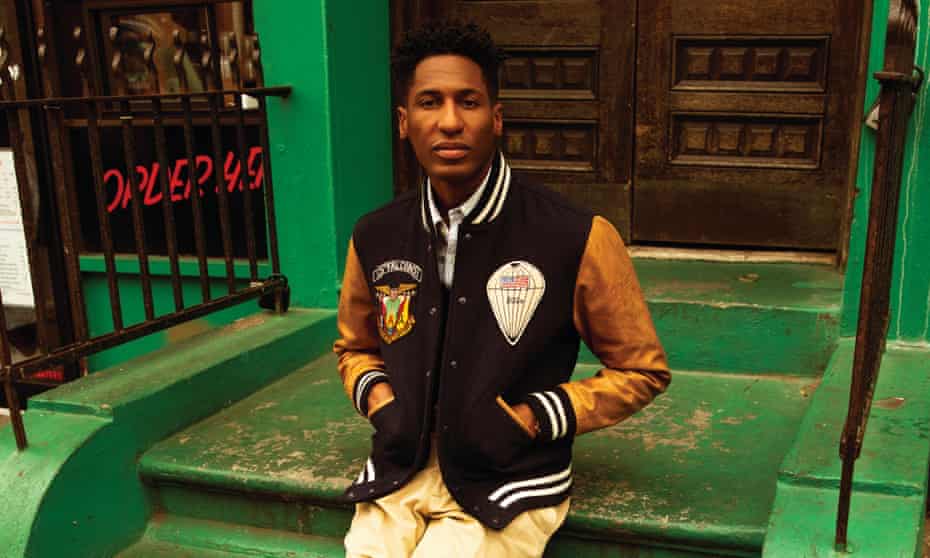
From scoring Pixar’s Soul to bandleading on The Late Show, Batiste is a fixture of American pop-culture. Now he wants his ‘social music’ to spark genuine political change
In June 2020, the composer and pianist Jon Batiste was on the move. During the week, he was scoring Pixar’s first Black-led feature, Soul, from his dressing room at the Ed Sullivan Theater, where he works as the bandleader for Stephen Colbert’s Late Show. He was finishing the music for his eighth album, We Are, while also composing a 40-minute symphony that will be performed by more than 200 musicians at Carnegie Hall next May. And on the weekends, he would then assemble a group of fellow players and march on the streets of New York, singing songs such as We Shall Overcome and Down By the Riverside to protest the deaths of Black Americans at the hands of the police.
From scoring Pixar’s Soul to bandleading on The Late Show, Batiste is a fixture of American pop-culture. Now he wants his ‘social music’ to spark genuine political change
In June 2020, the composer and pianist Jon Batiste was on the move. During the week, he was scoring Pixar’s first Black-led feature, Soul, from his dressing room at the Ed Sullivan Theater, where he works as the bandleader for Stephen Colbert’s Late Show. He was finishing the music for his eighth album, We Are, while also composing a 40-minute symphony that will be performed by more than 200 musicians at Carnegie Hall next May. And on the weekends, he would then assemble a group of fellow players and march on the streets of New York, singing songs such as We Shall Overcome and Down By the Riverside to protest about the deaths of Black Americans at the hands of the police.
“We were protesting to reaffirm our humanity,” a baritone-voiced Batiste says over a call from his New York home. “When George Floyd and Breonna Taylor were killed, Black people started to feel like our value as human beings was being stripped away – and we needed to speak to that in our own way, through music.” On Juneteenth – the date that commemorates the emancipation of African-American enslaved people – Batiste’s marches came to a head as the 34-year-old led a crowd of more than 10,000 people to Brooklyn public library, only a day after police had clashed with other protesters in the area. “There was a lot of tension in the air, since people had just gotten nailed by the authorities, but we showed up and it was the songs that brought us together, rather than to fight,” he says. “That is the power of social music.”
“Social music” is the catch-all term Batiste uses to describe his varied, jazz-referencing output. Born into a New Orleans musical dynasty, he first played drums at eight years old in the family group, the Batiste Brothers Band, before switching to piano and developing his ear by transcribing scores from video games such as Sonic the Hedgehog and Street Fighter II. By 17, he was immersed in the language of jazz and had already released his debut album, Times in New Orleans. Within the decade he had graduated from the prestigious Juilliard School, toured globally and counted the likes of Quincy Jones, Stevie Wonder and Herbie Hancock among his friends and mentors.
“All my work comes from within and each album is a record of a specific moment in time and in my life,” he says. “Which is why this latest record speaks to the protests that were happening. It is saying that as humans we all come from a common ancestry and lineage. Only we are the ones who can save ourselves. As long as there are evil forces in the world, the work is never finished.”
As he speaks, it becomes clear – in the manner in which he channels the pulpit’s emphatic mode of phrasing – that several of Batiste’s relatives are preachers. Indeed, it is hard to view his lauded career to date and not see him as marked out for success by a benevolent force. This year alone, he became only the second Black composer to win an Oscar (following Herbie Hancock’s 1986 win) for his work on Soul, has been nominated twice at this month’s Jazz FM awards and is currently undertaking a curatorial residency at Carnegie Hall.
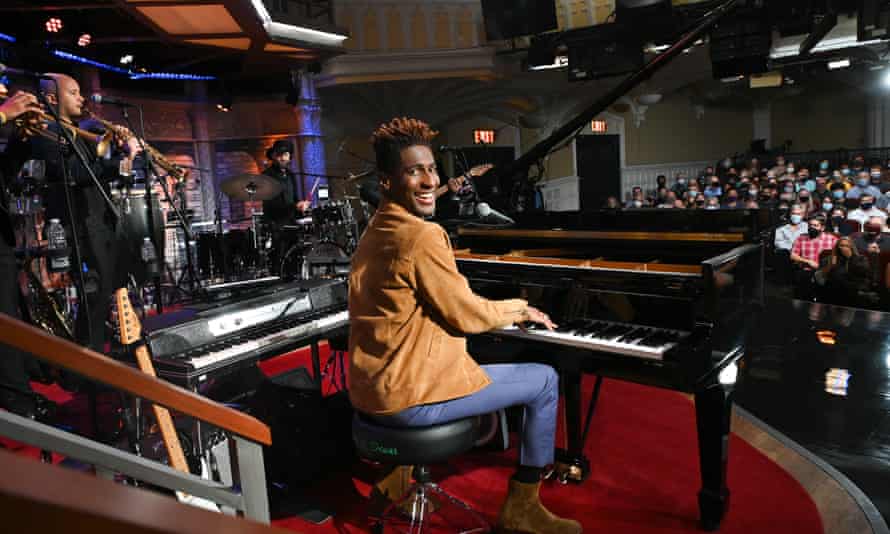
He sees We Are as his crowning achievement. “This is my debut in many ways, since it’s my first record on a label that speaks to who I am now as a grown-ass man,” he says. “It was made when I was 33, which is the year Jesus was crucified, so it marks an age of becoming, when so many great musicians like Marvin Gaye and Stevie Wonder made their finest work, too.” If We Are doesn’t quite reach the boundary-breaking genius of What’s Going On or Songs in the Key of Life, its sprawling 14 tracks traverse the gamut of Black American music and his own history, featuring the marching band from his old high school, his classmate Trombone Shorty and voice recordings from his niece and nephew – as well as famous friends Zadie Smith and Mavis Staples. “The rebirth and evolution of Jon Batiste,” is how he frames it.
For all the third-person pronouncements, Batiste’s success has inarguably been pivotal in introducing a wider audience to jazz, not least through inviting the likes of saxophonist Wayne Shorter and Philadelphia group the Heath Brothers to perform in front of an audience of millions on The Late Show. “I see jazz as a superpower,” he says. “It has never depended on popularity to maintain relevance because its value is undeniable; it represents all the nuances of the human soul. It is an honour to play this music because it is my heritage – it is the Blackest, deepest American classical music that has grown to become a universal art form. Jazz shows you that something can be from a specific experience and it can be adapted in a way that’s not appropriated.”
Batiste, who joined The Late Show in 2015, sees his role as unique in mainstream US television. “There are very few people who look like me in these spaces and I speak to things that I don’t hear anyone else bringing up on television,” he says. “I’m always humbled by the influence we can have on our audiences.”
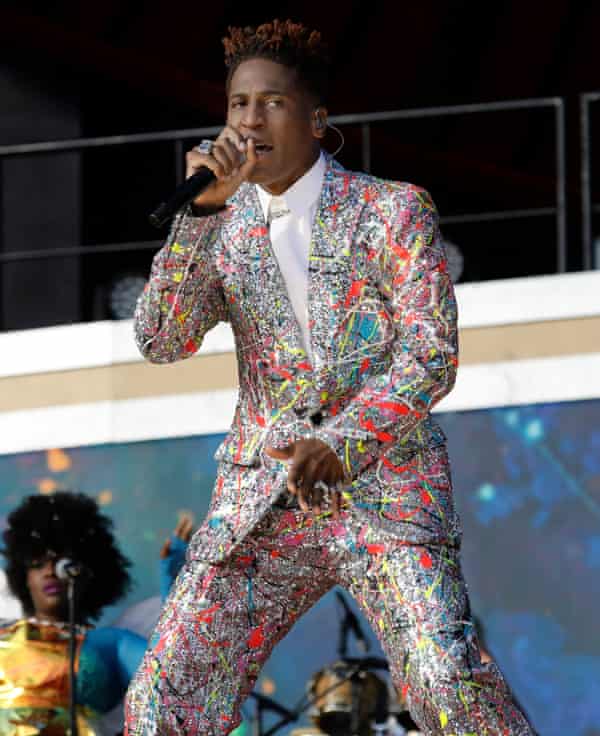
Since he was 21, Batiste has also been involved with the National Jazz Museum in Harlem, where he is now creative director, another role in which he uses jazz as a means of bringing people together. His programmes of events, held in a Harlem church basement, have seen the likes of the Cotton Club dancer Jacquie “Tajah” Murdock perform for an audience that might include “Mary from the corner store and Philip from the barber shop” as well as Lenny Kravitz.
It is this focus on representation for all walks of life that spurs on Batiste’s prodigious output. “It’s such a big deal for someone who looks like me and who is my age to get recognition and to win an Oscar for a movie about jazz that has a Black lead,” he says. “There is pressure in being a trailblazer, to somehow represent and uplift your community, but you don’t get many chances in life to succeed and it makes me tear up thinking about what this could mean to the next me, looking on.”
Continuing to carry the mantle, Batiste has a series of high-profile projects to come – including a Broadway musical on the life of the graffiti artist Jean-Michel Basquiat, and the premiere of his Carnegie Hall orchestral work, American Symphony.
“I’ve been working on this for three and a half years, writing my scores by hand,” he says. “And I’m proud to say it will be the first time in 130 years of Carnegie Hall that an all-Black orchestra has a featured performance. We’re going to make history and show everyone why we’re here, since the work is never done.”
The Jazz FM Awards 2021 will be livestreamed on Jazz FM on 28 October from 7.30pm.
https://www.latimes.com/entertainment-arts/awards/story/2021-12-07/jon-batiste-grammys-2022-colbert
For top Grammy nominee Jon Batiste, music is both birthright and calling. So is protest
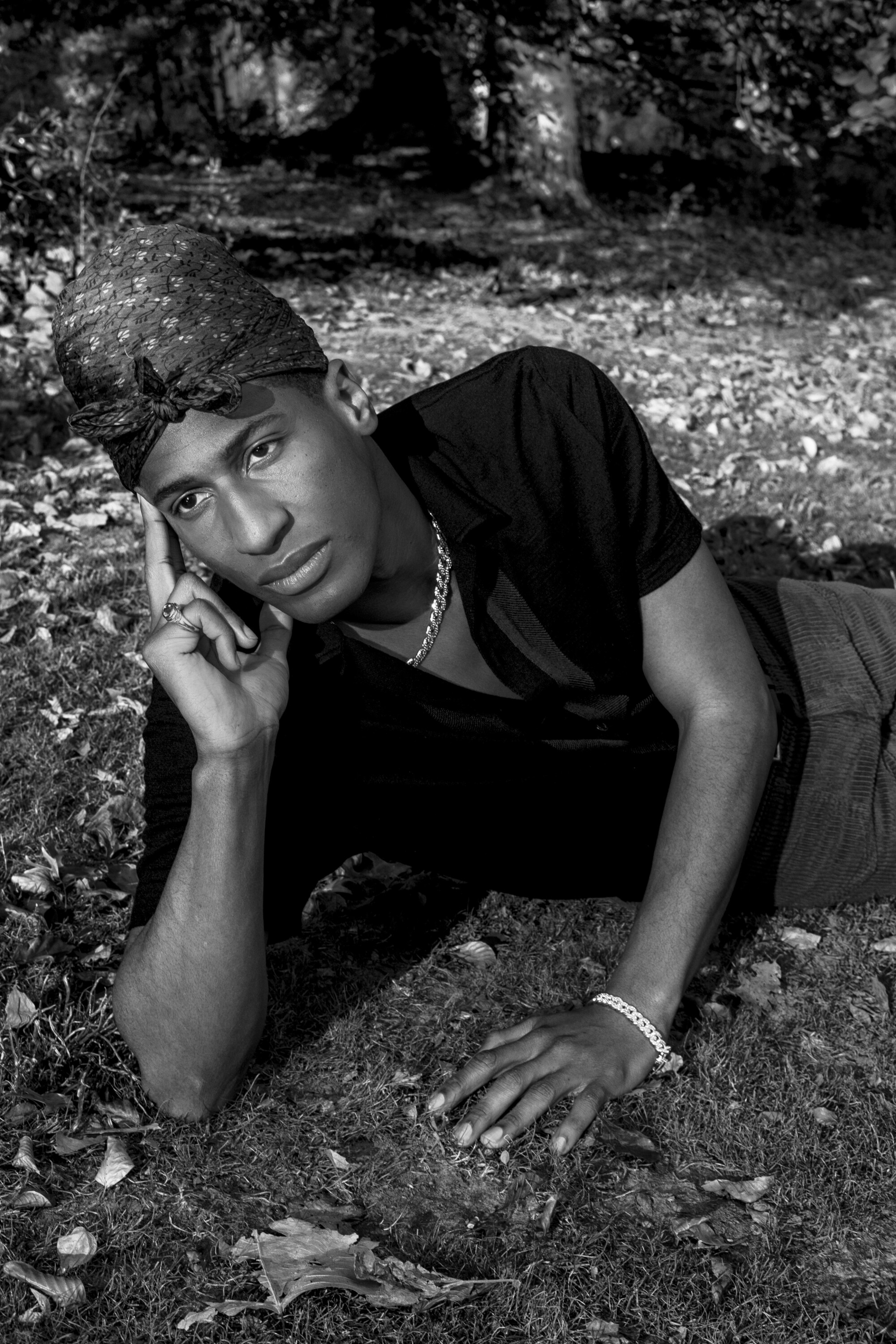
The most important day of Jon Batiste’s career got off to a bumpy start.
On Nov. 23, the day Grammy nominations were announced, Batiste was part of the morning livestream, and he had a challenging assignment: pronouncing the names of the nominees in five Latin or Mexican categories.
Batiste, who is not a native Spanish speaker, was nervous about navigating the tildes and the rolling Rs. “I was focused on being a good presenter and on carefully and respectfully trying to pronounce the names of the Latin artists,” he recalls with a laugh over Zoom. Some of the names were familiar to him, and with the rest, he moved cautiously through each syllable.
On Twitter, people were clowning the 35-year-old singer, piano player and bandleader for his slow cadence. “Jon Batiste fighting for his life,” one wag tweeted. And a TV executive added, “OK give Jon Batiste a Grammy for having to pronounce all of those names.” As it turned out, Batiste didn’t need any help.
Batiste completed his bilingual navigations, and then the American roots category was announced. Batiste had been nominated in that category before, in 2018, so he paid attention and heard his name announced for roots performance and roots song, both for his 2021 album “We Are.” “After that,” he recalls, “I couldn’t hear anything.”
There was a lot of noise in his New York apartment, because it was crowded with people, including his music collaborator Ryan Lynn; his longtime girlfriend, Swiss Tunisian writer and activist Suleika Jaouad; and his parents, sister and nephews, who flew up north because Batiste was riding on the Louisiana float in the Thanksgiving parade two days later. He got a couple more nominations, then a few more, then even more. “Every time my name was mentioned, it was pandemonium. It felt surreal after a while.”
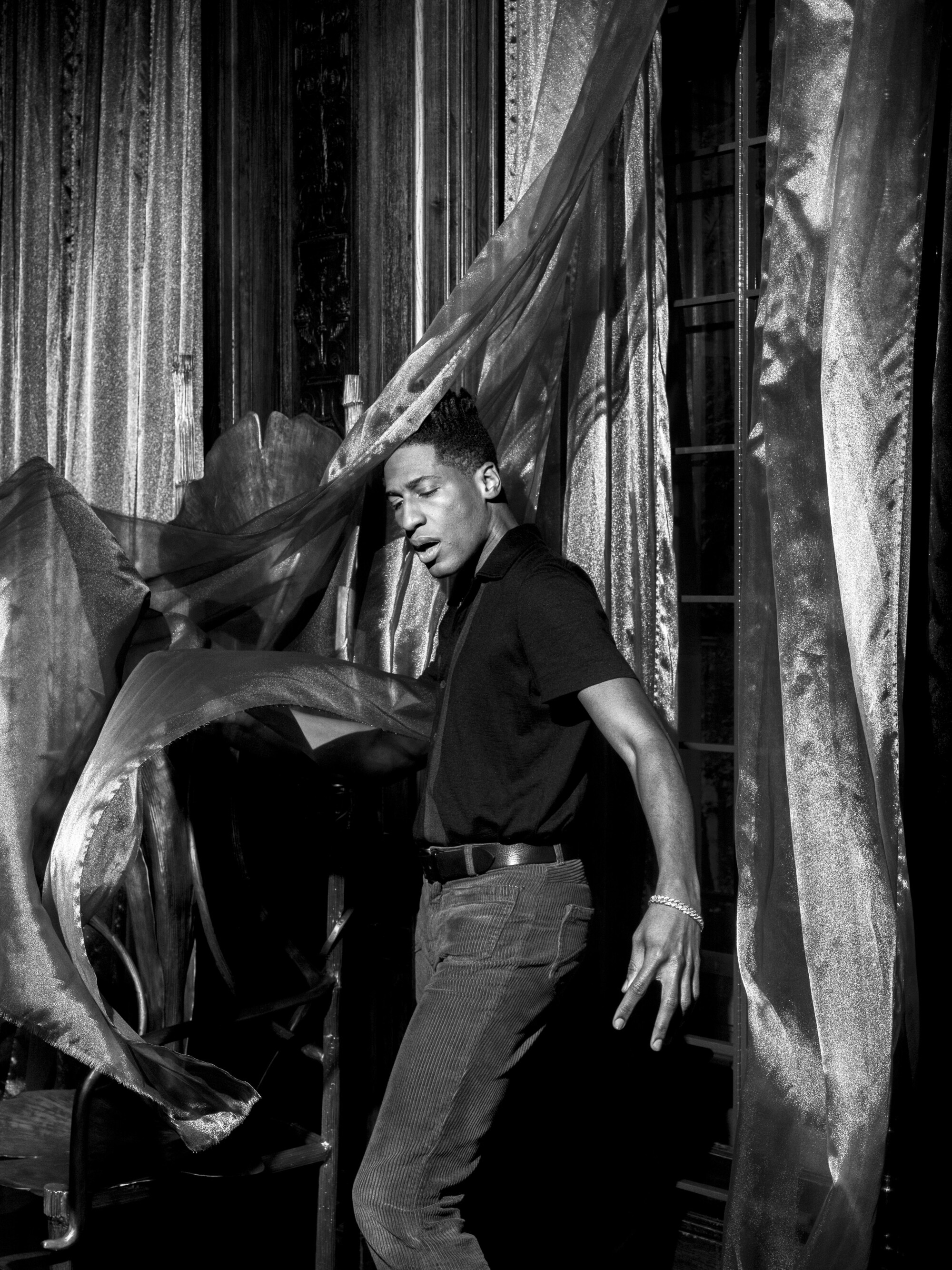
By the time the Grammys broadcast signed off, Batiste had been nominated 11 times (a tally exceeded only twice, by Michael Jackson in 1984 and Babyface in 1997), including for album of the year and record of the year. But it wasn’t just the volume of nominations that was extraordinary, it was also the range. In addition to American roots, Batiste was nominated in R&B, jazz, score, video and classical categories.
Although he’s on network TV as the musical director of “The Late Show With Stephen Colbert” and he won an Academy Award this year as a composer for the Disney-Pixar animated film “Soul,” Batiste is someone who’s known more to cognoscenti than to the masses. In the tradition of the “Who is Bonny Bear?” question that circulated widely in 2012, after the little-known Bon Iver won a best new artist award at the Grammys, the dominant question on social media on Nov. 23 was “WTF is Jon Batiste?”
Fortunately, Batiste is adept at explaining WTF he is, analyzing what his success means and explaining what he wants to accomplish. He emphasizes two interrelated biographical details: He’s from a music family, and he’s from New Orleans.
“In New Orleans, music is part of the fabric of everyday life,” he says. “It’s our daily bread.” And, he points out, his hometown harbors a wild array of musical styles, partly due to its importance as a port city: the Spanish, French and British all passed through, as did the African and Caribbean diasporas, and West Africans from several countries arrived via slave ships.

“There’s an amalgamation of culture that’s rooted in community, and even foods, dances or social functions that go with that music. Everybody plays music because that’s the culture. The guy people buy weed from in high school plays the trumpet.”
His father, Michael Batiste, is a bassist who has performed with greats like Jackie Wilson and David Ruffin. Michael is also a co-founder of the long-running Batiste Family Band, which at one point, according to the band’s website, included 23 family members. Jon’s cousins include the late Alvin Batiste, an accomplished jazz clarinetist, and drummer Russell Batiste Jr. of the Funky Meters, one of New Orleans’ preeminent bands.
At age 8, Jon began playing drums in the family band, sometimes in front of thousands of people. When he was 11, at the suggestion of his mother, he started playing piano. Two years later, he was leading his own bands and starting to form ideas about making music that acknowledges and pays respect to genres but isn’t limited by them.
While he was growing up in a New Orleans suburb, Batiste saw relatives deal with shady club owners and predatory music publishers. “I was an early student of the business, watching my dad and family, seeing how to create an environment where people want to come to your gigs, how to have a band that sounds like you and not everybody else. I understood the ecosystem of leading a band. When I went to New York, I applied all that to a way bigger playground.”
By age 17, Batiste had graduated high school and enrolled at the Juilliard School, a performing arts college in New York, where he eventually got bachelor’s and master’s degrees in jazz studies. He resolved to keep control of his music while he was still expanding and refining it.
“Major labels began offering me record deals when I was 18 and 19, and I turned all of it down. I wanted to do my own independent, circuitous route.” One of his independently released albums, 2013’s “Social Music,” crested at No. 1 on the Billboard jazz album chart. He was invited to appear on “The Colbert Report” and dazzled host Stephen Colbert by leading members of the audience out of their seats and into the streets, where they sang and danced. When “The Late Show With Stephen Colbert” debuted on CBS in September 2015, Batiste was the bandleader and second banana.
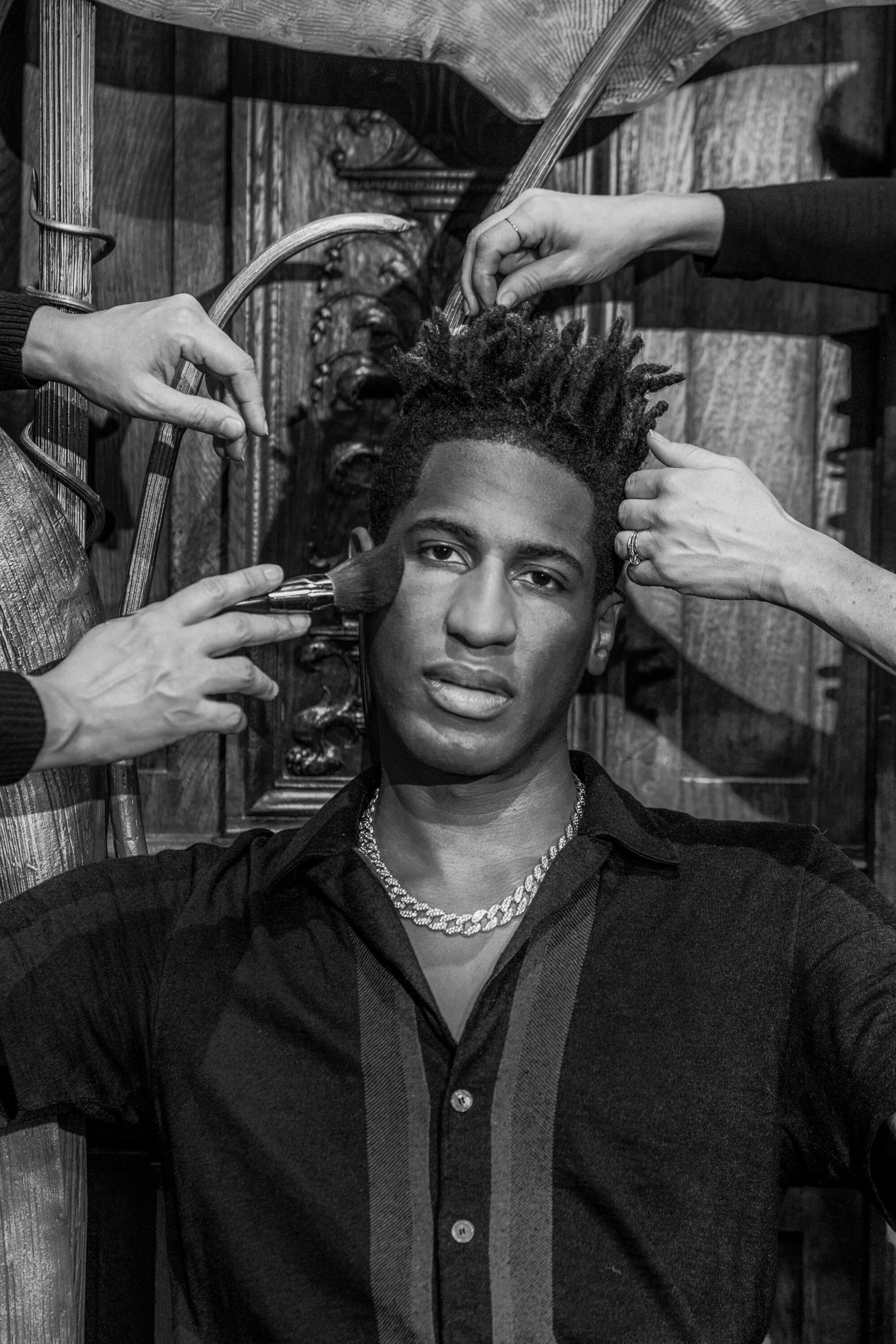
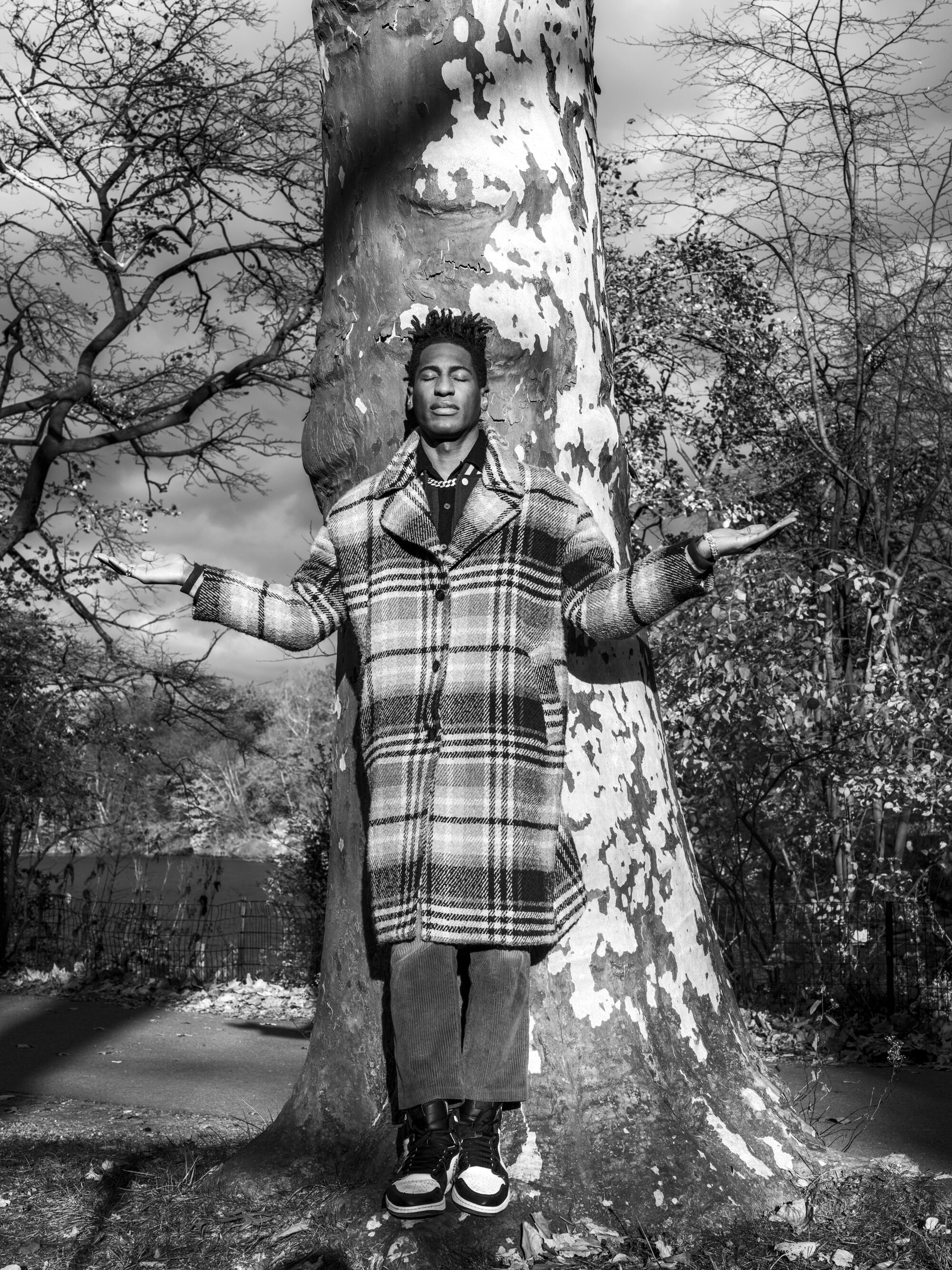
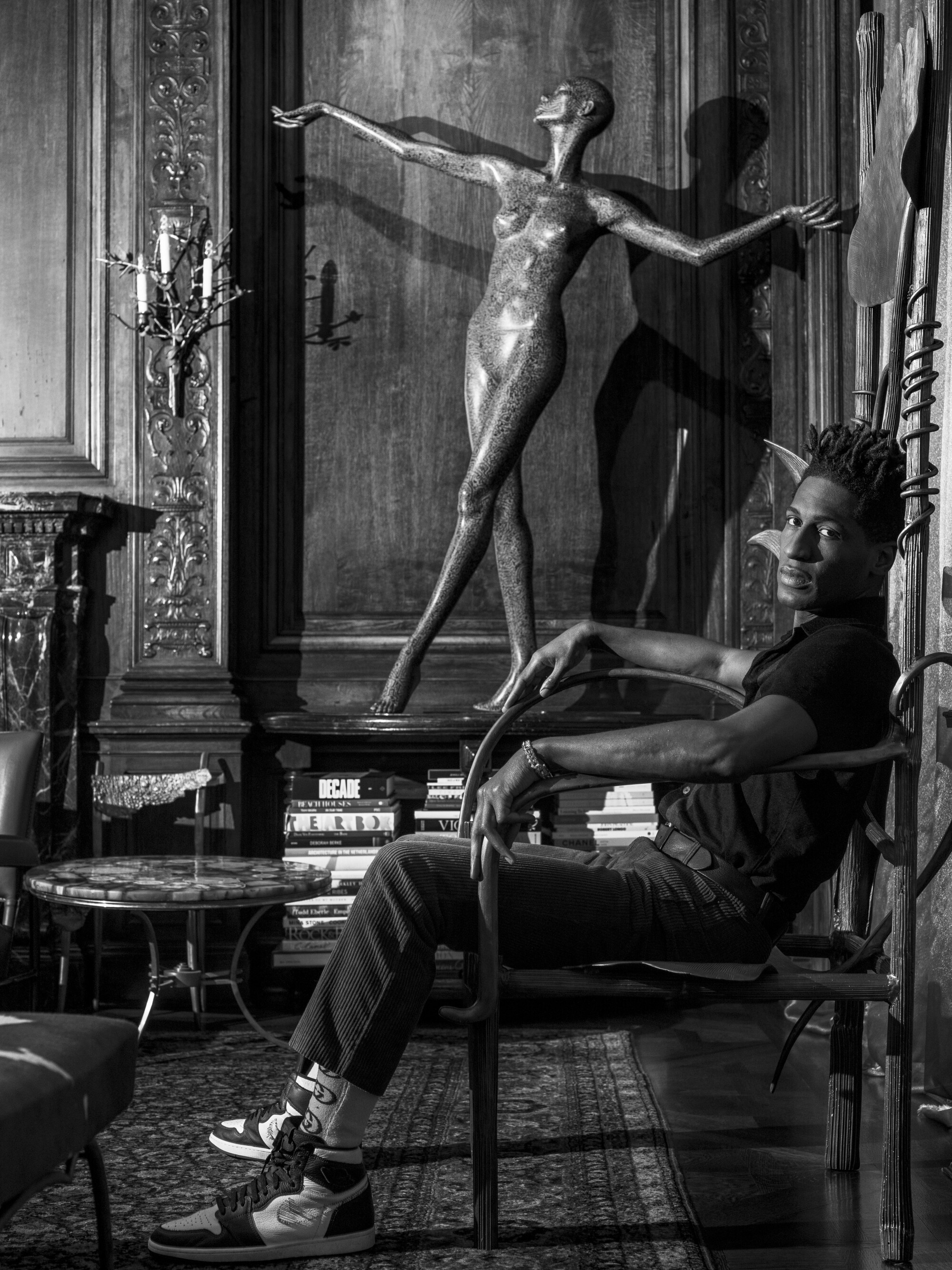
This brought an end to his independent, wayfaring phase. “Because of the TV show, I wasn’t gonna be able to tour nearly as much as I had, so I figured I may as well sign a record deal.” His first album on the Verve label was “Hollywood Africans,” a solo voice-and-piano LP he’d made with producer T Bone Burnett, whom Batiste met at a birthday party for U2 singer Bono, if you need a concrete sign that he was nearing the big time.
Batiste thinks of “We Are” as his first proper studio album, partly because it was the first time he had a budget that didn’t come out of his own pocket.
“Jon did it himself,” says star guitarist Robert Randolph, who played on “We Are.” “He produced and wrote the music. He’s the guy in charge, and it’s his vision.”
“We Are” was also the first time Batiste understood and could articulate his worldview, an idealistic and universal humanism in which music unites people but also acknowledges the specific struggle Black people face.
He participated in Black Lives Matter marches, voter registration rallies and protests after the slayings of George Floyd, Breonna Taylor and Ahmaud Arbery. “Whenever I do that kind of stuff, it makes me understand what my purpose is out here. I have a platform already, but I have to build the platform too. If people see you from afar, they don’t feel you, they don’t feel your vibrations and see you out there putting your life on the line in the first wave of the pandemic with police next to you, scowling at you —”
Batiste, who’s grown increasingly impassioned, stops short and laughs. “I don’t mean to preach at you, brother.” He steadies himself and continues. “We have to be with the people, otherwise it’s just empty words, empty notes. People have to feel that you really mean it, that it’s heartfelt.”
There’s nothing distant or ironic about Batiste’s music. His unconstrained avidness is a big part of what elevates “Soul,” one of the best-reviewed movies of the last few years, which centers on Pixar’s first Black protagonist, jazz pianist Joe Gardner.
“‘Soul’ is a love letter to jazz. How do we present the spirit and ethos of jazz without whitewashing it? I worked on it for 2½ years, not only as a composer but as a consultant. I was obsessed with being as authentic as possible.”
His mix of virtuosity, sincerity and positivity is a big part of what made Batiste catnip for Grammy voters. He’s socially conscious but not “radical,” accessible but not tawdry and respectful toward musical traditions. “It’s great to see him become popular,” says Randolph, “but everybody in the world of musicians already knew he’s great.”
Batiste puts a lot of responsibility on his own shoulders: to represent his family as well as his hometown, to unite listeners across boundaries, and to describe Black struggle without succumbing to despair. I asked why it was important to him to embrace such a substantial challenge.
“There’s been a void in our culture for a while. We look at music as an opportunity for upside. But beyond any financial gain or level of scaling, music is sacred stuff, man. And I feel almost called to bring it to people in these hard times. If I don’t, who will?”
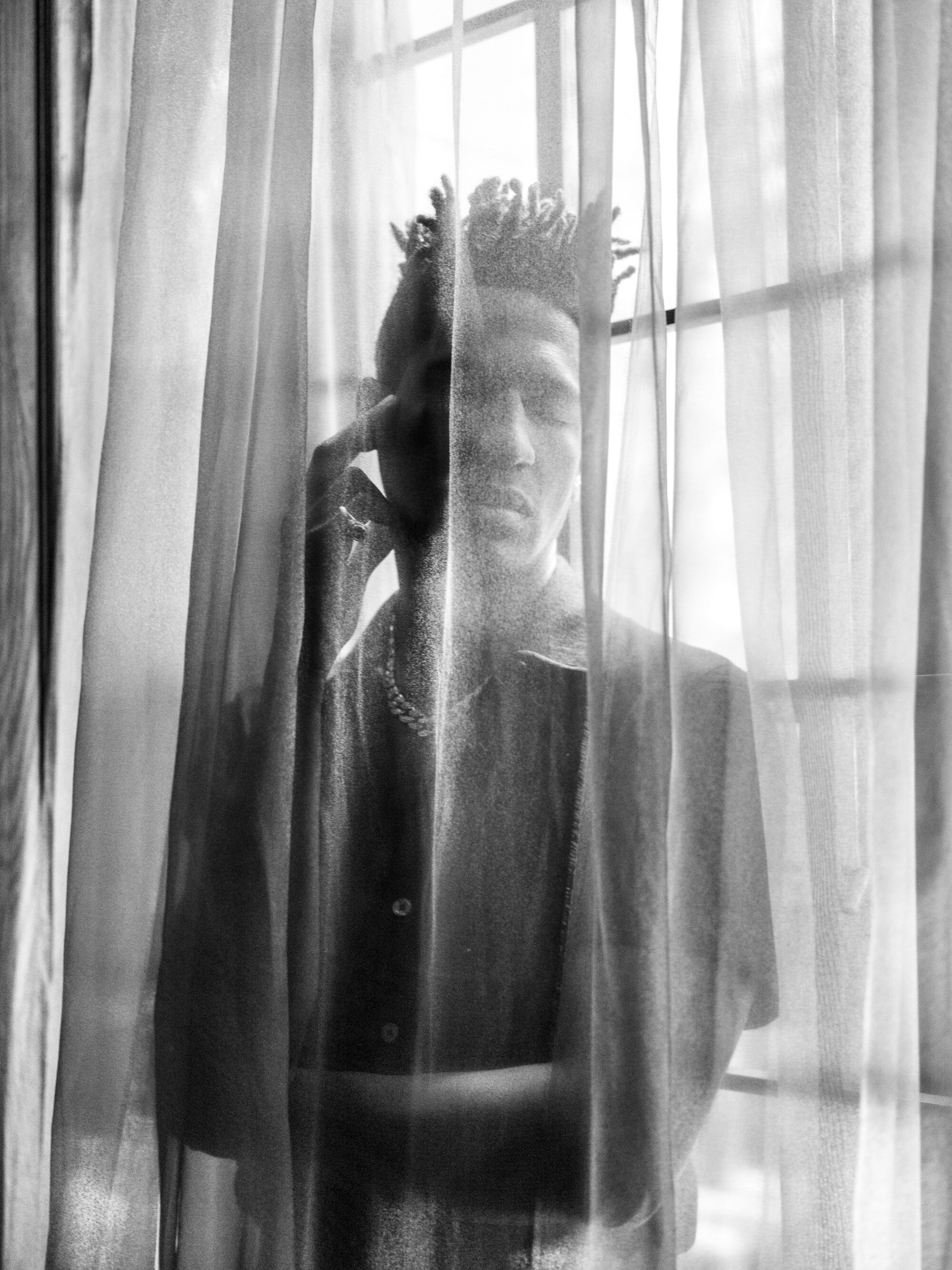
https://www.nytimes.com/2017/10/27/opinion/jon-batiste-fats-domino.html
Op-Ed Contributor
Jon Batiste: Fats Domino and the Rock ’n’ Roll I Didn’t Know
My
first exposure to rock ’n’ roll came from watching mostly white bands
like Nirvana, Korn and Limp Bizkit perform angsty songs on MTV. I bought
some of their albums, but the genre didn’t really resonate with me
until I learned that black people could be rock ’n’ roll artists too.
None had as great an influence on me as Fats Domino, one of the biggest
stars of the early rock ’n’ roll era, who died on Tuesday in Harvey, La.
I was raised in a musical household in New Orleans. I played the drums and piano as a child, and my dad played bass. He and his bandmates encouraged me to study the history of rock ’n’ roll, not dismiss it. In one of my weekly runs to Blockbuster’s used CDs section, I found a Led Zeppelin CD, which eventually led me to Jimi Hendrix. He was the first black person I learned about who played rock ’n’ roll — a term I thought was fixed but whose meaning kept expanding.
Around then, I began to play gigs with bands that would occasionally cover Mr. Hendrix’s songs, and it was powerful to watch the audience react. I wanted to be able to tap into that kind of energy too, but also to balance it with something else I couldn’t quite identify yet.
Around 1998, when I was 12 years old, I sat in on one of my father’s gigs and first heard “Blueberry Hill” by Fats Domino. The song seemed deeply familiar; it was almost as if it was otherworldly, floating somewhere in the ether. I had never heard such a percussive piano section. Folks of various ages and races got up to dance and sing along in a joyous communal outburst.
In this yearslong study of rock ’n’ roll, I had finally arrived at the beginning: Fats Domino.
While jazz was born in New Orleans in the early 1900s, and the city played a significant role in shaping rock ’n’ roll, Antoine Domino, known as Fats, was one of the few musicians who bridged those two genres. He was influenced by the first and laid the groundwork for the second.
The world began to take notice of Mr. Domino’s music in 1949 with the release of “The Fat Man” by Imperial Records. Through the 1950s and early ’60s, he gained enormous fame, selling 65 million singles, with 23 gold records. Even Elvis Presley said Mr. Domino had influenced him.
For years, the famed disc jockey and concert promoter Alan Freed presented Mr. Domino’s “race records” on the radio to growing audiences at home and overseas. But over time, the music industry marketed black rock ’n’ rollers like Fats Domino, Chuck Berry, Little Richard and others in a way that all but erased their legacy from what millennials like me had considered rock ’n’ roll.
Maybe that explains why it was only after I enrolled at Juilliard when I was 17 years old and really studied Mr. Domino’s catalog that I fully grasped the significance of the fact that an African-American man, born in the Jim Crow South, was a founder of a mostly white musical movement.
Mr. Domino pioneered a rollicking style of piano playing. His approach brought together extremes: It was both straight and swung (a defining trait of rock ’n’ roll), percussive and melodic, aggressive and sweet. The push and pull created a feeling that was both sophisticated and accessible.
Rhythmically, his style embodied the spirit of New Orleans. He brought together second-line parade music and boogie-woogie piano, which was basically brothel music. He could also write and reinterpret music that was not traditionally performed by black artists and filter it through his sensibility. It was colloquial. It was irresistible.
When I was growing up, most of what I heard about Mr. Domino was that he was friendly and a sharp dresser. But my father told me a story about Mr. Domino during a sound check that shows he was a musician of the highest order. Mr. Domino was practicing his signature piano style while talking to a reporter. With the discipline of an army general, he continued playing until he was satisfied, cordially shooing the interviewer away so that he could focus.
I’ll also remember Mr. Domino’s humility. He never believed the hype about him. And he was immune to taking himself too seriously. I’ve even heard musicians talk about how he would bring his pots and pans on tour and cook red beans and rice for the crew.
My colleagues and I on “The Late Show With Stephen Colbert” often joke about people in the “establishment.” To us, they represent almost the antithesis of progress and creativity. But when it comes to music, the “establishment” includes artists like Fats Domino.
Fats Domino passed away this week, knowing full well that he holds a rare title: founder of both the jazz and the early rock ’n’ roll establishments. As we celebrate his achievements, we ought to remember the real roots of rock ’n’ roll, our national music.
ABOUT THE AUTHOR:
Jon Batiste (@JonBatiste) is the bandleader for “The Late Show With Stephen Colbert.”
Follow The New York Times Opinion section on Facebook and Twitter (@NYTopinion), and sign up for the Opinion Today newsletter.https://www.nytimes.com/2020/06/24/arts/music/jon-batiste-jazz-protests.html
Jazz Is Built for Protests. Jon Batiste Is Taking It to the Streets.
The pianist and “Late Show” bandleader has been bringing musical wake-up calls to events across New York.

Jon Batiste, the jazz pianist and “The Late Show With Stephen Colbert” bandleader, has spent the last three weekends marching in the streets of New York, leading musicians and protesters through hymns and songs like “We Shall Overcome” and “Down by the Riverside.” Those without a horn or drum sing and, at Mr. Batiste’s exhortation, say their names: George Floyd. Breonna Taylor. And many others.
On June 12, however, Mr. Batiste opened his protest concert, part of a series called “We Are,” seated at an upright piano in front of the Barclays Center in Brooklyn, wearing a mask and bright-blue protective gloves. Unaccompanied, surrounded by hundreds of silent protesters, he dug deep into a song that he says demands reinvention: “The Star-Spangled Banner.”
“We all know that Francis Scott Key owned slaves,” Mr. Batiste said of the song’s lyricist in a Zoom interview last week. In Mr. Batiste’s hands, the national anthem seethes, mourns and aspires, drawing on the rollicking stride piano of Fats Waller and the volcanic eruptions of Art Tatum..
“The way that Jimi Hendrix took the song, the way that Marvin Gaye or Whitney took it — that tradition is what I am thinking of when I play it,” Mr. Batiste, 33, added. “The diaspora that they infused into it is a response to the toxic ideologies that are embedded in the song and thus in the culture.

The history of jazz is in many ways a history of protest, of celebrating blackness and insisting on individual freedom. The composer and bass player William Parker, who has taken free jazz from community centers to Town Hall, traces this spirit to works like Duke Ellington’s 1943 “Black, Brown and Beige” to later suites by Max Roach and Sonny Rollins, and the free jazz and loft jazz movements of the 1960s and ’70s. Then came the ’80s, when “everybody went to sleep thinking that we had accomplished something, but all we really got were the leftovers,” Mr. Parker said in a Zoom interview. Artists like Mr. Parker, of course, have performed and recorded revolution-minded “fire music” through the 1980s and up to the present, and the last decade has seen a resurgence in political jazz music, especially from the downtown, avant-garde and Brooklyn scenes.
It’s certainly rare, though, to see a jazz musician with a household name and a national platform like Mr. Batiste inviting thousands into the streets. And the pianist has the support of Mr. Colbert, who has carved out time on his broadcast to discuss his musical director’s activism.
“In the present darkness that constitutes so much of the national conversation, Jon, by his example and his spirit, gives me hope I might do my job and maintain my own humanity,” Mr. Colbert said in an email. “I believe long after no one knows who I am, the name Jon Batiste will be spoken with admiration. I’m grateful to know him.”
A
genre-crossing virtuoso and crowd-pleaser, Mr. Batiste is particularly
suited for a moment of protest in the streets: He’s from New Orleans,
where the city’s famed Second Line marches have built a tradition of
“catharsis and release,” he said, in which music lifts anguish or
outrage toward a collective joy. He grew up surrounded by musical
relatives and draws special inspiration from his grandfather, the
president of a New Orleans postal workers union, who marched and
organized for his workers.

“Jon is walking in that lineage, and not just musically,” said Brian Blade, a drummer and composer with his own strong New Orleans connection. “It’s in the essence of our feet on the ground, moving forward, gathering a movement through example.”
A spirit of collective humanity has always powered Mr. Batiste’s art. His “Late Show” band, Stay Human, is a diverse ensemble known for marching right into the crowd during performances. The protests take their name from “We Are,” his new single, a pop gospel showcase written and recorded last year that features the marching band from St. Augustine High School in New Orleans. He recorded “The Star Spangled Banner,” with all that thunder, on the 2013 album “Social Music.” And at the marches the music is indisputably social.
“It was such a powerful day,” the saxophonist Grace Kelly, a frequent Batiste collaborator, said of Mr. Batiste’s June 6 march from Union Square to Washington Square Park, which organizers say drew 5,000 people. “There were over 10 tubas, 30-plus trumpets, and maybe 50 saxophones. It was louder than we could speak. Louder than we could sing.”
Mr. Batiste and his organizers are weighing the logistics of taking the “We Are” protests to cities across the United States in the coming months, focusing on a practical goal: voter registration and the exposure of voter suppression.
“There are three candidates that we’re dealing with,” Mr. Batiste said. “Donald Trump, Joe Biden and the candidate of apathy. Apathy’s insidious. It comes from having a weight on our collective shoulders for centuries that has made us feel that we don’t matter, that we’re not seen and that our vote doesn’t count.”
Like many of the city’s jazz players, Caroline Davis, a saxophonist and composer, has protested at several Brooklyn and Manhattan rallies in recent weeks. “It’s inspiring to be with people who are in this for the long haul,” she said, after marching with Mr. Batiste on June 6, the first time she’s gotten to play music with colleagues in person since March.
Ms. Davis co-teaches a course in jazz and gender at the New School and feels a responsibility to honor jazz’s history of protest. “I feel that, as Nina Simone said, it’s the artist’s job to reference the time in which we live,” she said.
Mr. Parker has dedicated his career to nurturing that activist spirit. He has marched dozens of times since 2016 with the Artists for a Free World marching band, a loose collective organized by Arts for Art, the nonprofit organization that hosts the annual Vision Festival and is currently presenting Zoom concerts and salons.
“I’ve been talking for the last, oh, 40 years or so about how every once in a while a window opens up and things can happen,” Mr. Parker, 68, said. “But we have to have numbers, we have to be persistent, and we have to really lay it out in the consciousness of people.”
Last week, on Bandcamp he released the searing and mournful “Baldwin,” a track from an upcoming 10-disc box set of new material dedicated to “those who want to eliminate hate, racism, sexism, greed and lies.”

He’s not alone in sharing fresh music keyed to the cause: The drummer Johnathan Blake and the vibes player Joel Ross both released pre-Covid commissioned concerts from the Jazz Gallery on YouTube. The sets, titled “My Life Matters” and “Being a Young Black Man,” come with requests for donations to Black Lives Matter and the NAACP Legal Defense Fund. And the poet Camae Ayewa shouts: “Enough! Enough! Enough!” over the free-jazz squall of “Irreversible Live in Berlin” on a pair of blistering live sets from the protest-minded quintet Irreversible Entanglements.
“Music is a wake-up call,” Mr. Parker said. “After the protest, you listen to it and it helps keep you awake. Because the problem is not to wake up — it’s not to go back to sleep.”
Mr. Batiste believes it’s his responsibility to use his platform to keep the crowds awake. That platform is also expanding. Mr. Batiste’s fingers will power the music in “Soul,” the first Pixar feature to center on a black lead, slated for a Nov. 20 release. He has maintained the kind of proudly unpredictable career common to 21st-century jazz musicians. In 2019 he released a pair of in-the-tradition Verve albums recorded at the Village Vanguard. Since then he’s debuted a funk-favoring band of all-women collaborators on NPR’s Tiny Desk Concerts and improvised on an independent release, “Meditations,” with the guitarist Cory Wong.
Despite his personal success, he remains focused on the inequality he’s committed to fighting. “Four hundred and one years of people and their voices being completely marginalized has led to systemic racism and sexism that has been perpetuated even in our triumphs,” he said. “The idea that we can have triumphs and also perpetuate toxic ideologies is a nuance that we have yet to explore in the public dialogue. But now there’s a chance for a real collective consciousness shifting.”

Jon Batiste Can't Keep His Fingers Off The Piano

Considering how busy Jon Batiste has been – what with being the bandleader on The Late Show with Stephen Colbert, composing the award-winning soundtrack to the Disney/Pixar film Soul and releasing his own record – you might be astonished at just how chilled out he is in conversation. We recorded this interview over video chat, and he was seated at the piano in the studio where he's been taping The Late Show. At one point, Batiste absent-mindedly starts playing piano while he's answering a question, but you'll also hear him play very intentionally, including two live cuts recorded just for World Cafe.
Stream the session in the audio player or enjoy an extended video performance, recorded live for WXPN's Free at Noon Concert.
AUDIO: <iframe src="https://www.npr.org/player/embed/990176442/990235198" width="100%" height="290" frameborder="0" scrolling="no" title="NPR embedded audio player"></iframe>
Jon Batiste On Sharing Joy In A Painful Year: 'I Want To Reaffirm People's Humanity'

Jon Batiste performs at a voter registration event in Brooklyn, N.Y., in June 2020.
Kevin Mazur/Getty ImagesDuring the pandemic, Jon Batiste took his music to the streets. This summer, the music director and bandleader for The Late Show with Stephen Colbert performed at marches protesting the killing of George Floyd. Recently he did a pop-up performance at a mass vaccination site in New York.
"I wanted to articulate through the music and through my presence there that we're all in this together," Batiste says. "Ultimately, this is our time. This is our world. We have to come together and understand that or else everything is going to completely disintegrate."
Batiste has a new album, We Are. He also recently won a Golden Globe and a Critics Choice Award for composing the music for the animated film Soul. He joined Fresh Air from his home piano, where he played music from We Are, songs from Soul and a remarkable rendition of the national anthem.
Batiste sings and plays music throughout this interview, explaining his process. Click the audio link above to get the full experience
AUDIO: <iframe src="https://www.npr.org/player/embed/976023961/976109096" width="100%" height="290" frameborder="0" scrolling="no" title="NPR embedded audio player"></iframe>
The Evolution Of Jon Batiste, Music Consultant Of Pixar's 'Soul'
Jon Batiste has earned a good deal of praise for his behind-the-scenes contribution to the new Pixar movie, SOUL. Last fall, he spent his 33rd birthday playing an intimate, private concert with his band in the round while Jazz Night in America captured the show. He kept it classy, donning a suede jacket and playing selections from his two latest Verve releases, Chronology of A Dream and Anatomy of Angels.
You probably know Jon Batiste as bandleader and musical director on The Late Show with Stephen Colbert. But his credentials are deep as the roots of the Batiste family tree. He's the co-artistic director of the National Jazz Museum in Harlem, and has been a collaborator with everyone from pop singer Tori Kelly to the Jazz at Lincoln Center Orchestra. He's graduate of both the New Orleans Center of the Creative Arts and the Juilliard School, and an alumni of both Wynton Marsalis' and Roy Hargrove's bands.
For the past decade, he's developed his version of "jazz 2.0," which includes what he calls "social music." Its lineage stems from Batiste's native New Orleans but also runs through his adopted hometown of New York City, thanks to elders like Lionel Hampton and Dr. Billy Taylor, who brought jazz from the concert halls to the streets. But Batiste is also a part of yet another lineage: jazz musicians in late-night television. On our radio show — with help from Batiste's Late Show predecessor Paul Shaffer, its current Executive Producer, Chris Licht, and NPR television critic Eric Deggans — we'll trace some of that history, learning how Jon Batiste developed his role.
- "If You're Happy And You Know It" (Joe Raposo, arranger: Jon Batiste)
- "PRINCE"
- "HIGHER"
- "Round Midnight" (Thelonious Monk, Bernard D. Hanighen, Charles Cootie Williams)
- "PWWR"
- "BLACCK"
- "SOULFUL" (Roy Hargrove)
- "ORDR"
Video Set List:
Musicians:
Jonathan Batiste: piano, vocals, bandleader; Giveton Gelin: trumpet; Jon Lampley: trumpet, tuba; Eddie Barbash: alto saxophone; Tivon Pennicott: tenor saxophone; Endea Owens: bass; Joe Saylor: drums; Negah Santos: percussion.
Credits:
Producers: Alex Ariff, Colin Marshall, Katie Simon; Concert Recording Engineer: David Tallacksen; House Audio Engineers: Greg Hanson, Meghan England; Concert Video Director: Colin Marshall; Director of Photography: Nickolai Hammar; Videographers: Tsering Bista, Jack Corbett, Annabel Edwards, Nickolai Hammar, Niki Walker; Editor: Annabel Edwards; Lighting Designer: Igor Yachmenov; Lighting Board Operation: Zack Lobel; Lighting Deck Electrician: Tricia Swietek; Project Manager: Suraya Mohamed; Senior Producers: Colin Marshall, Katie Simon; Supervising Editor: Keith Jenkins; Executive Producers: Gabrielle Armand, Anya Grundman; Senior Director of NPR Music: Lauren Onkey.

How To Stay Human: Jon Batiste Talks With Lara Downes
A few months ago I was scrolling through my phone and found that Jon Batiste had shared my new single with his Instagram followers. I DM'd him my thanks and we chatted about the music and its composer, a Black woman named Florence Price who was a brilliant musical pioneer in the 1930s. We talked about the trailblazers who've come before us and about the work we do to honor their legacy. In this isolated and dark year, it was a lovely moment of connection, light and positivity between musicians. Of being human.
Jon's band — the band he leads on The Late Show with Stephen Colbert — is called Stay Human. He formed the group in 2005 when he was still a student at Juilliard, building an inclusive, genre-fluid sound and a philosophy devoted to connection and what he calls "good vibes." Back when they were kids playing music on the New York subway, the band would bring those vibes onto a packed train to transform a weary commute. These days, the vibes go out to millions of Late Show viewers, a hopeful send-off to another long, hard day.
Everything Jon does — with the band and in his solo music — is in the spirit of uplift. This summer, that meant taking to the streets to lead crowds of Black Lives Matter protesters in freedom songs, spirituals, and the song we most needed to hear as we mourned Black lives lost and dishonored: "Lift Every Voice and Sing." It was Jon's turn to show up, following the long tradition of Black music and musicians, bringing songs to heal us in times of trouble, to rally us in times of crisis. For Jon, born into a large family of New Orleans musicians and raised on second line parades and jazz funerals, music is a blended language that expresses grief and loss, pride and joy.
Our conversation is about lifting every voice. It's about the mission we share to move beyond categories, in music and life. We show up and bring the vibes wherever they're needed. We celebrate our ancestors and stand on their shoulders with pride and gratitude. We listen to each other and to the world around us. We raise up the next generation, teach them well and let them fly. In these very last days of this very hard year, this is a conversation about looking ahead and looking up, towards the rising sun of a new day.
(We had so much to talk about. Listen to an extended version of this conversation. )
https://livesessions.npr.org/artists/jon-batiste
Jon Batiste

Photo Credit: Courtesy of the artist
Jon Batiste is a globally celebrated musician, educator, bandleader and television personality whose musical skill, artistic vision and exuberant charisma make him a triple threat with unlimited potential. Recognized for his originality, jaw-dropping talent and dapper sense of style, Jon transitions from commanding the piano with virtuosic skill to soulfully crooning to wailing on the “harmonaboard” (a kind of harmonica and keyboard) to curating unique "social music" experiences all over the world. Born into a long lineage of Louisiana musicians, Batiste eventually went on to receive both his undergraduate and masters degrees in piano from the Juilliard School and formed his band, Stay Human. The Forbes 30 under 30 honoree balances a demanding performance schedule—which often includes his signature, impromptu ‘love riot’ street parades—with his role as bandleader with the Late Show with Stephen Colbert, Artistic Director At Large of the National Jazz Museum in Harlem, public speaking engagements, master classes and occasional acting gigs. He played himself on the HBO series Treme and most recently appeared in director Spike Lee’s Red Hook Summer. The New York City-based musician has released several self produced independent albums, including "MY N.Y." which was recorded entirely on the street corners and subways of NYC and "Jazz is Now" featuring his singular approach to jazz standards and jazz composition in the classic piano trio format. Jon's only label partnership to date occurred when he partnered with Razor & Tie, the small Greenwich village based record label, for his 2013 release entitled "Social Music" which went on to spend over a month atop the both Billboard Jazz charts and iTunes Jazz charts as the #1 jazz album in the world. Most recently, he released a new album with the Jazz at Lincoln Center Orchestra led by Wynton Marsalis entitled “The Music of John Lewis." It features material written by John Lewis, best known as the pianist and musical director of the Modern Jazz Quartet.
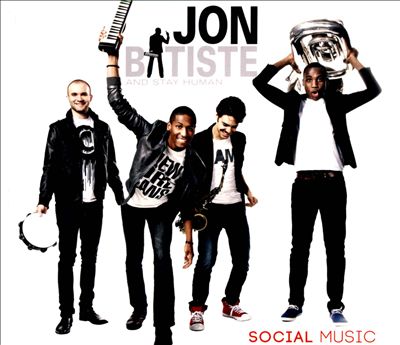
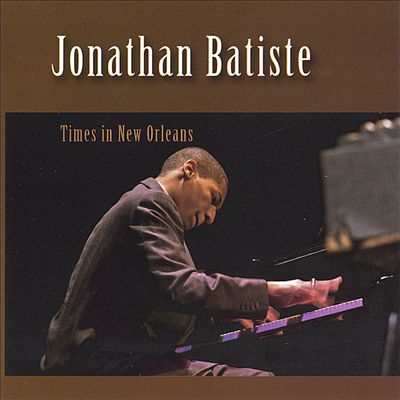
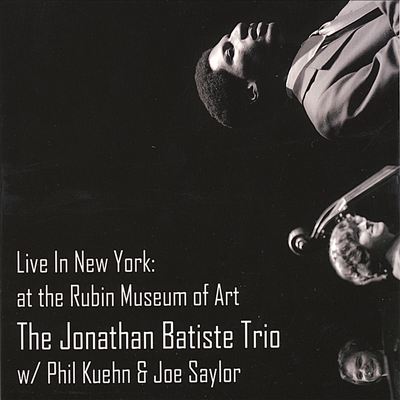
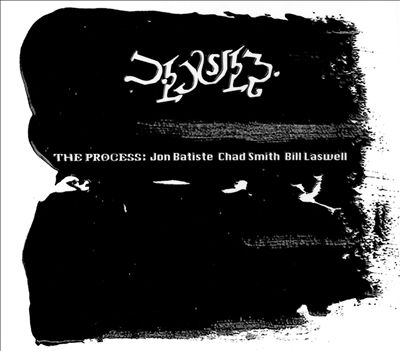
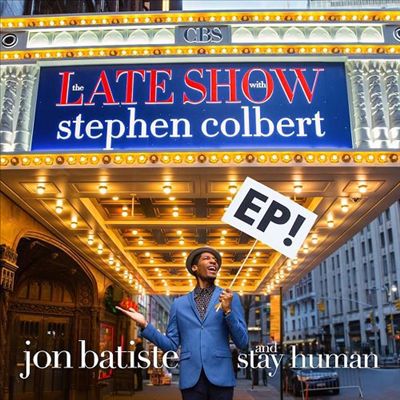
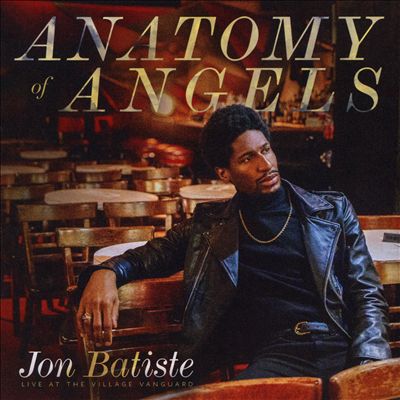
![Music From and Inspired by Soul [Original Motion Picture Soundtrack]](https://rovimusic.rovicorp.com/image.jpg?c=E3v3mCfo7JTPMTrrG1jyUR_TZlp6n_cq-Emr2zx15tU=&f=4)

